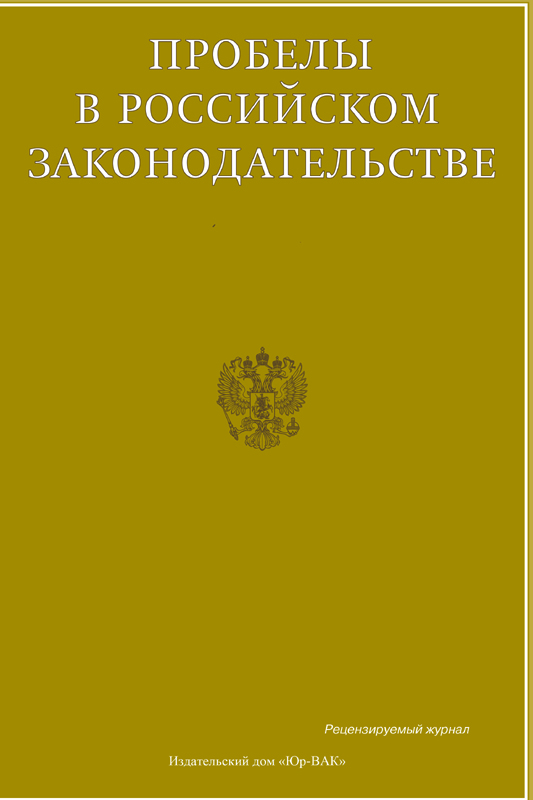Radicalism as a Factor of Destabilization of the World Political Situation
- 作者: Kurshev A.K.1
-
隶属关系:
- North Caucasus Institute for Advanced Studies (branch) of the Krasnodar University of the Ministry of Internal Affairs of Russia
- 期: 卷 15, 编号 4 (2022)
- 页面: 149-153
- 栏目: Articles
- URL: https://journals.eco-vector.com/2072-3164/article/view/531636
- ID: 531636
如何引用文章
详细
The purpose of this study was to study the phenomenon of radicalization. Due to the lack of an empirical basis, difficulties also arise with the definition of a single concept of radicalism, the methodology of its study, the methodology for measuring its indicators, and, accordingly, it is not possible to consider the factors associated with the process of radicalization. Summarizing the variety of interpretations proposed by various authors, we note that radicalization is understood as the process of transition from non-violent forms of expression of opinions to violent actions. The process of radicalization does not occur linearly, it acts as a complex causal relationship. Radical opinions are not a crime. However, participation in violent extremism and terrorism is already a crime. And as law enforcement officers confirm, the greatest risk group is young people, because due to a misunderstanding of the goals of destructive ideologies, they fall under the influence of their emissaries, becoming on a par with extremists and terrorists. The growth of radical sentiment in recent years has been facilitated by the Internet environment, which determined the global, viral, scalable and cascading effect of online radicalization. The time period of the process of radicalization was shortened, and the ideological, financial, organizational and transnational ties of ultra-right extremist communities were actively consolidated. It has been established that radicalism, being a predictor of extremism and terrorism, remains in the role of a global geopolitical risk and a threat to international security. A significant role in strengthening right-wing radicalism was played by the possibilities of the Internet environment, which made it possible to unite like-minded people on a global scale. These communities flooded all major social platforms and alternative information platforms with extremist content, thus forming a vast virtual ecosystem of right-wing extremism. In addition, huge amounts of fake news began to enter the Internet space, which increased the vulnerability of the entire society and states, which, as a result, acts as a destabilizing factor in the world political situation.
全文:
作者简介
Albert Kurshev
North Caucasus Institute for Advanced Studies (branch) of the Krasnodar University of the Ministry of Internal Affairs of Russia
Email: albert.kurshev@mail.ru
police lieutenant colonel, Senior Lecturer, Department of Fire Training Nalchik, Russia
参考
- Bovina I.B., Bovin B.G., Tikhonova A.D. Radicalization: socio-psychological view (part I) // Psychology and Law. 2020. V. 10. No. 3. pp. 120-142.
- Golovnev V.V., Shcherbinina E.V. Actual issues of hybrid conflicts in the conditions of modern reality // In the collection: Donetsk Readings 2017: Russian world as a civilizational basis for the scientific, educational and cultural development of Donbass. Materials of the International scientific conference of students and young scientists. Dedicated to the 80th anniversary of DonNU. under the general editorship of S.V. Bespalova. 2017. pp. 11-13.
- Islamic radicalism as a factor of destabilization of the world political situation: Abstract of the thesis. ... candidate of political sciences: 23.00.02 / Petrukhina Anna Alexandrovna; [Place of protection: Mosk. state un-t im. M.V. Lomonosov]. - Moscow, 2012. 28 p.
- Kalney M.S. The phenomenon of ideology, its place and role in modern socio-cultural conditions // In the collection: Greater Eurasia: development, security, cooperation. Yearbook. Moscow, 2022, pp. 137-140.
- Karpova A.Yu., Saveliev A.O., Vilnin A.D., Kaida A.Yu., Kuznetsov S.A., Maksimova N.G., Chaikovsky D.V. Far-right radicalization: a technique for automated detection of threats using WEB MINING // Bulletin of the Russian Foundation for Basic Research. Humanities and social sciences. 2020. No. 5 (102). pp. 30-43.
- Lopushansky I.N. Radical foundations of the ideology of extremism // In the collection: Economic security of the individual, society, state: problems and ways of ensuring. Materials of the annual All-Russian scientific-practical conference: in two volumes. St. Petersburg University of the Ministry of Internal Affairs of Russia; Compiled by Yu.A. Kudryavtsev. 2016. pp. 21-29.
- Naumov D.I., Porhomtsev V.N. Information warfare as a tool of social destabilization: theoretical and methodological aspect // In the book: V International Penitentiary Forum "Crime, Punishment, Correction" (dedicated to the Year of Science and Technology in the Russian Federation in 2021). Collection of abstracts of speeches and reports of participants. In 9 volumes. Ryazan, 2021, pp. 190-196.
- Poltavtseva O.N. New media and global threats of our time // In the book: Society, economics, law: topical issues and vectors of development. Monograph. Petrozavodsk, 2021, pp. 85-100.
- Pokhilko A. A. Extremism and radicalism as political categories: conceptual and terminological apparatus // Young scientist. 2013. No. 11 (58). pp. 738-742.
- Radjabov D.Z. Theoretical and methodological approaches to the study of youth radicalism as a factor in the modern political process // Bulletin of the Pedagogical University. Series: Philosophical Sciences. 2021. No. 1 (2). pp. 138-145.
补充文件








